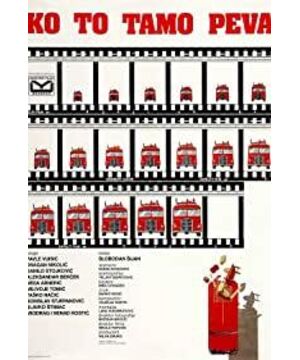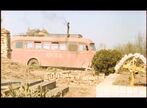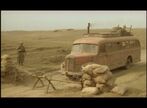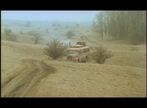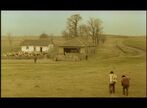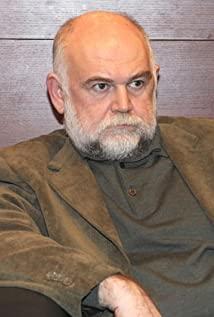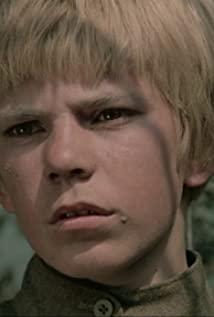This sentence is not written to prove that the world is hopeful.
I just want to say that this is a world of pure despair.
This is the truth of nothing and nothing.
If you were living in a country overrun by soldiers, everything you did would be absurd.
Some people are going to die, some people are going to carry guns to hunt, some people are going to sing songs on the road, and some people are collecting stones and pretending to be gentlemen, whether it is to kill the priest or be chased by the priest's son and nephew, or to extort and form a group along the way. Watching a live sex show in the woods, everyone seems to be out of that depressing backdrop.
Of course, more than just looks, the director actually didn't make it clear that these people had too much connection with the war at hand.
Writing this, I remembered that when the Japanese army attacked Lugou Bridge, the common people either closed their doors or climbed high to watch the battle, and more often they rushed to the city of Beijing within the high wall.
The truth is, the war is far away in Belgrade and has nothing to do with them.
To a certain extent, the country has nothing to do with them, let alone the famous Yugoslavia. "Once upon a time, there was a country called Yugoslavia..." I think everyone is familiar with the opening line in "Underground". Yugoslavia, whether in terms of region, nation, or history, is a tragedy in itself. .
Therefore, "Who Sings There" can only be an absurd tragedy in the context of the German bombing.
Certainly a difficult movie to comment on.
I think when most people rate, they must have no confidence if they get four stars and five stars.
I don’t think the director doesn’t want to tell a complete story, but he must know that a complete story accompanied by a strong desire to talk will inevitably lead to the predicament of the priest’s nephew’s speech at the tomb.
The priest was shot, and the murderer was "they", and his nephew was very distressed, telling the grand truth of seemingly noble: "In short, you have been led...to a bright path..."
He said that he wanted to kill the murderers. They kept choking and lyrical until people dispersed one after another, leaving only a few people.
correct. Telling a story runs the risk of such a small audience. The average person is indifferent to the death of others, let alone a road movie without a story. So let's talk about a state that completely abandoned the stories, or completely abandoned the beginnings and turns of those stories. In this film, the director just recorded how a group of people rushed to Belgrade.
The director's ingenuity is evident.
So from the story, this movie must be boring.
But based on the European-style narrative tradition, this unremarkable tone gave me a lot of reminders in the slow camera.
For example, is war really what your phenomenon is like? Is the world really what you think it is?
There are always a number of similar works that make people feel overwhelmed.
For example the following poem.
"The Anecdote of the Jar" Stevens
I put the jar in Tennessee and
it was round and stood on the top of a hill.
It makes the scattered wilderness
centered on this hill.
All the deserts come to the jar, and they
bow down all around, and they are no longer deserts. The jar is round and stands majestically
on the ground , with extraordinary style. It ruled everywhere, and this grey, unpatterned jar , which did not breed birds or bushes, was unlike anything else in Tennessee. This poem is famously inexplicable. In my opinion, it may be a play. Of course, you can derive any result you want based on your own opinion. This kind of work gives us the possibility of open interpretation.
The movie is the same in a way.
But after all, the movie gives us various hints in many places. Those that hold more detail than a poem are fascinating.
Even in this movie, I saw a contrast between the German attack steps that never appeared behind the scenes of stealth were so clear and the life of the country people was so loose. "Look, they can resist such a powerful force?" The squire who always spoke for the Germans, who could never die, said this to the retired soldiers.
The end, of course, was the bombing of Belgrade. Before the bombing, the people killed in the car also beat the two Roma who were "singing and walking".
This is the last absurd scene.
The lightness of tragedy lies in the grandeur of the background. Those who ran to Belgrade died in a bus. This death is too light, because behind it is a collapsed city. Even, in the movie, there is no scene of their death.
The two Roma sang again--
"...this crazy and thorough attack, they want to destroy everything and build a world again. Sunday is gone, fascism has destroyed all life, I am So unfortunate, because I'm still a child, with all the sadness in my arms, I can only sing, bless, ah, mother, everything is just a dream..."
Like the tramp waiting for Dogo, he really understands People who know the true meaning of life (haha, this sentence is really hypocritical!! In fact, I also think that they are both fools and don't understand anything~), it seems that they are just those two Roma people who can't stop singing.
(In between writing this article, I cooked a bowl of dumplings. Because I was hungry, this may be a comfort to despair.)
Of course, there is also a comfort in the movie, who can drive blindfolded and love monkeys and rabbits With the young man of the pig, he is the only "joyful" soul, because he is a fool.
He was also the only stranger weeping at the priest's grave.
Unfortunately, he also became a military vehicle driver. I think it's the director's viciousness to let the naive him enter the army and participate in that kind of terrifying confrontation game.
Oh, but this is also true. Whoever told us we were all those pigs who were stopped at the back of the bus.
Such a desperate world. The city collapsed in the rubble, and those "respected and admired urbanites: doctors, lawyers, architects..." in the words of the priests and nephews may not be able to protect themselves.
There is no logic at all, only facts.
So it's a very worthwhile movie to watch. The light-hearted tone of the shots in the film, and the seemingly coherent but unwavering stories that have no storytelling at all, are great challenges for moviegoers.
But I see the maturation of purely lens language beyond literary stories.
The film did not give up the discussion.
"I know, Father, because I'm seriously ill, no one loves me anymore. Everyone drives me away and avoids me." Facing the food that the priest handed over, I think it symbolizes the dying Yugoslavian patients say so.
The priest reassured: "You know, people are afraid of sickness."
He coughed badly and didn't believe the Bible: "...all of this, I've seen, experienced, this car, these people, this river. Everything! There is no difference between this world and the other... What happened to this world? People are killing each other like beasts."
View more about Who's Singin' Over There? reviews


